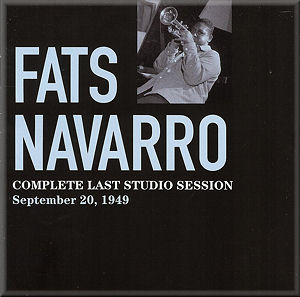1. Wailing Wall (Take A)
2. Wailing Wall (Take B) Incomplete
3. Wailing Wall (Take C) Incomplete
4. Wailing Wall (Take D)
5. Wailing Wall (Take E)
6. Go (Take A) Incomplete
7. Go (Take B)
8. Go (Take C)
9. Go (Take B/C)
10. Go (Take D)
11. Go (Take E)
12. Infatuation (Take A) Incomplete
13. Infatuation (Take B)
14. Infatuation (Take C) Incomplete
15. Infatuation (Take D)
16. Stop (Take A) Incomplete
17. Stop (Take B)
18. Stop (Take C) Incomplete
19. Stop (Take D)
20. Lullaby in Rhythm
21. High on an Open Mike
22. Sweet Georgia Brown
Fats Navarro - Trumpet
Don Lanphere - Tenor sax
Al Haig - Piano
Tommy Potter - Bass
Max Roach - Drums
Track 20 only
Fats Navarro - Trumpet
Tony Scott - Clarinet
George Shearing - Piano
Chuck Wayne - Guitar
Leonard Gaskin - Bass
Ed Shaughnessy - Drums
Tracks 21 & 22
Fats Navarro - Trumpet
Charlie Ventura, Allen Eager - Tenor saxes
Bill Harris - Trombone
Ralph Burns - Piano
Al Valente - Guitar
Chubby Jackson - Bass
Buddy Rich - Drums
Fats Navarro was one of the pioneers of bebop and in 1949 he shared
top trumpet spot in the Metronome Magazine Jazz Poll with Miles Davis
and Dizzy Gillespie. Unfortunately he only lived to the age of 26,
being killed by heroin addiction in July 1950. If an example to young
people is needed in the reason to avoid messing with drugs, his short
life demonstrates the waste of an enormous talent.
These recordings were made a year before his death and it is certain
that, had he lived, he would have developed his playing in the manner
that Miles and Dizzy did. His work at this time is exceptional, as
is the tenor playing of his front line partner Don Lanphere who, but
for family support, would probably have gone the same way.
Despite the brilliance of the whole band, I found the numerous takes
of each tune too much; I would have preferred the best two takes of
each tune.
All the tunes except Wailing Wall are based on the chord sequences
of standards.
Go is The Way You Look Tonight, Infatuation is Body
and Soul, and more obviously Stop is Pennies from Heaven.
The sound reproduction on the bonus tracks 20, 21 and 22 is pretty
awful and I find it hard to enjoy even the best of jazz under these
circumstances.
For any one unfamiliar with the work of Fats Navarro, the sleeve
notes by Matias Rinar are very informative and a pleasure to read.
As these tracks demonstrate, recording techniques improved dramatically
during the 1950s.
Don Mather
